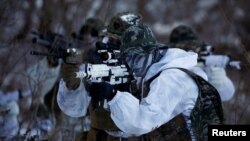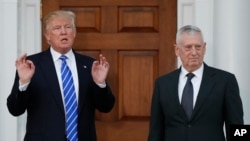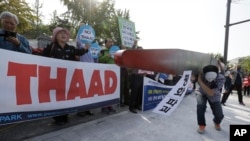Some South Korean conservatives are citing President Donald Trump’s past statements on reducing U.S. security commitments in Asia to argue that their nation must now prepare its own nuclear option to defend against the growing North Korean nuclear threat.
“I’m not saying we should develop nuclear weapons overnight. I’m saying that if there are the right conditions, then we should go nuclear,” said Lee Choon-kun, a researcher with the Korea Institute for Maritime Strategy, at an event sponsored by the East Asia Foundation in Seoul Tuesday.
Following his presidential election victory in November, Trump and his security advisers have reassured officials in Seoul and Tokyo that Washington would maintain strong regional military alliances and continue to pressure the Kim Jong Un government in Pyongyang to give up its nuclear weapons program.
The U.S. Defense Secretary James Mattis is expected to visit Japan and South Korea next week, and he is likely to highlight the importance of these key U.S. Asian alliances.
Contentious times
But South Korea’s nuclear advocates expect contentious times ahead. They take seriously Trump’s criticism, made during the campaign, that South Korea does not pay its fair share for hosting the 28,500 American personnel and military bases in Korea. And they take Trump at his word that, if better compensation terms are not reached, he would consider withdrawing American troops, allowing allies to acquire their own nuclear weapons, and ending the nuclear umbrella mutual defense pacts that require the U.S. military to come to the aid of its allies.
THAAD litmus test
South Korean officials are reportedly planning to object to any proposed increase in defense reimbursement costs with the United States. Seoul currently reimburses Washington about $866 million annually, that is more than 50 percent of the cost for stationing troops in country. South Korea also spends 2.4 percent of its gross national product (GDP) on national security, compared with 1 percent for Japan and 1.16 percent for Germany, according to the defense ministry in Seoul.
Nuclear proponents say that growing resistance in South Korea to the deployment of the U.S. THAAD missile defense shield could also create a rift in the U.S. alliance.
The THAAD system, which uses interceptor missiles to target high altitude incoming ballistic missiles, is considered a conventional deterrent to North Korea’s increasing ballistic missile capability. Supporters claim it will help defend South Korea from a nuclear missile attack.
Opponents say its capability is limited and vulnerable to low altitude missile strikes that could target population centers like Seoul that are close to the inter-Korean border. Some South Korean critics also say THAAD is being deployed to protect U.S. military installations in Korea, and China complains that its powerful radar system could be used to monitor other countries in the region.
Beijing’s strong objections to THAAD and reports of related Chinese economic retaliation against South Korea have also contributed to the declining support in South Korea. In December, public opposition to THAAD increased to 51 percent according to a poll conducted by Realmeter.
THAAD opponents say it is a continuation of confrontational policies that have not worked to slow North Korea’s nuclear and missile development programs.
“The policy that we have implemented has been failing. We have to see the nuclear issue from a different perspective,” said Cheong Wook-sik, the director of the Peace Network in Seoul.
Nuclear proponents say South Korea must prepare for even the remote possibility that resistance to THAAD and the refusal to increase defense sharing costs could lead to Trump threatening to abandon South Korea.
“I think national security is preparing for the worst case scenario,” Lee said.
Nuclear option
Proponents say South Korea could quickly develop nuclear weapons using existing nuclear power plant facilities and fuel, and with the military’s advanced conventional weapons production capability.
However, South Korea would likely face severe consequences for violating the Nuclear Non-Proliferation treaty (NPT) that could include diplomatic isolation and international sanctions similar to what North Korea is facing.
And it could also lead to Japan and other countries developing their own nuclear deterrent.







